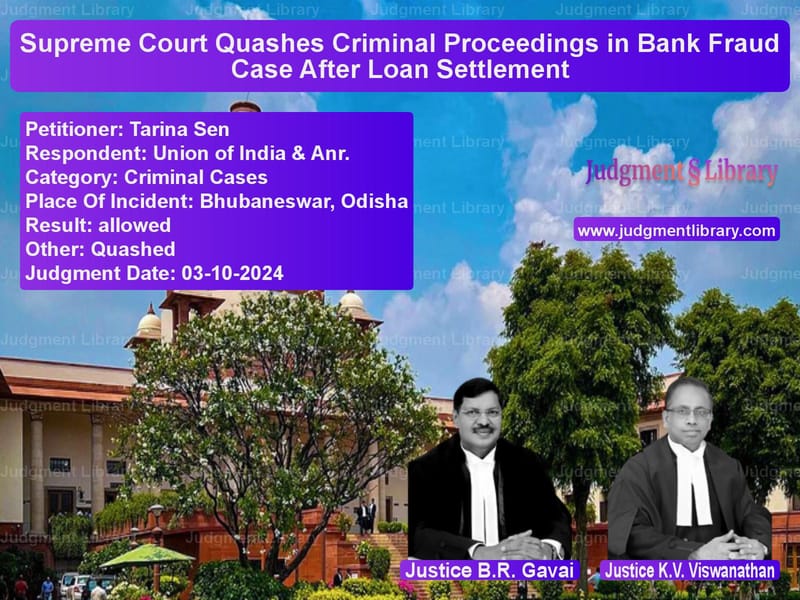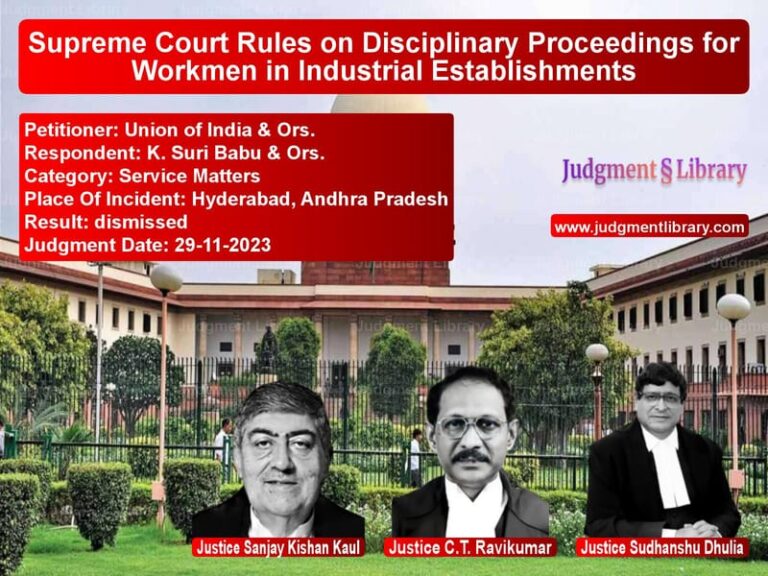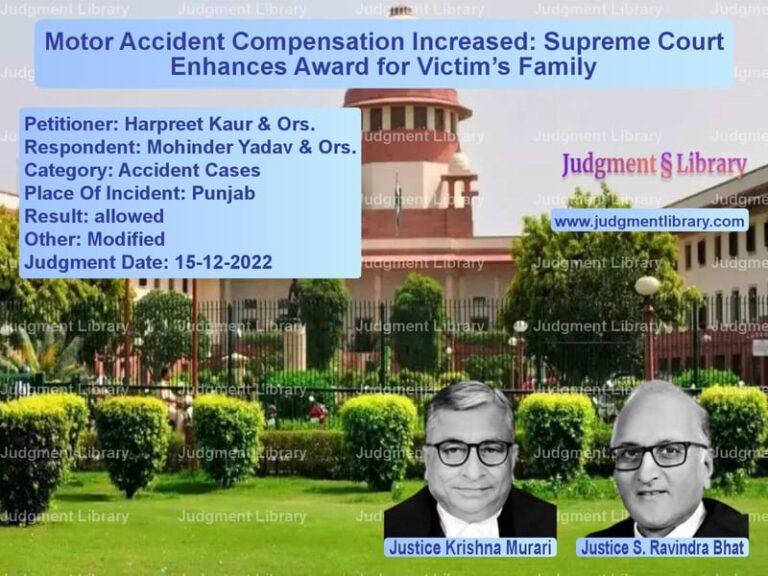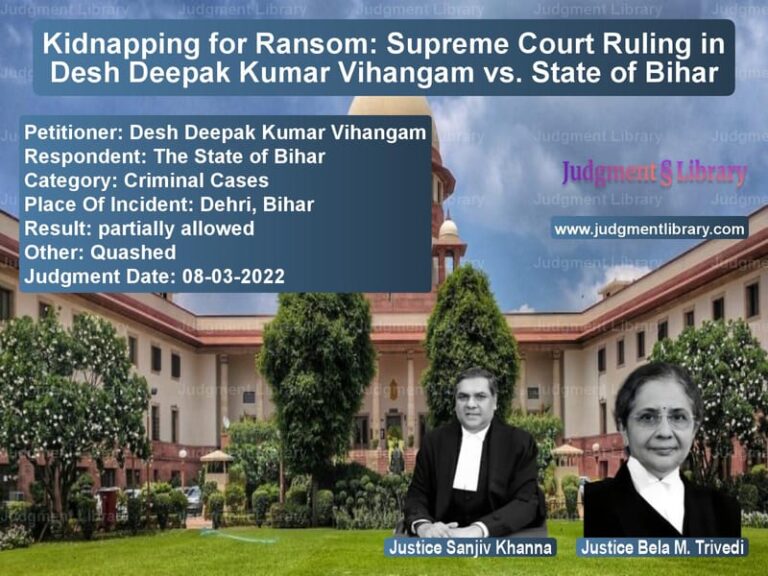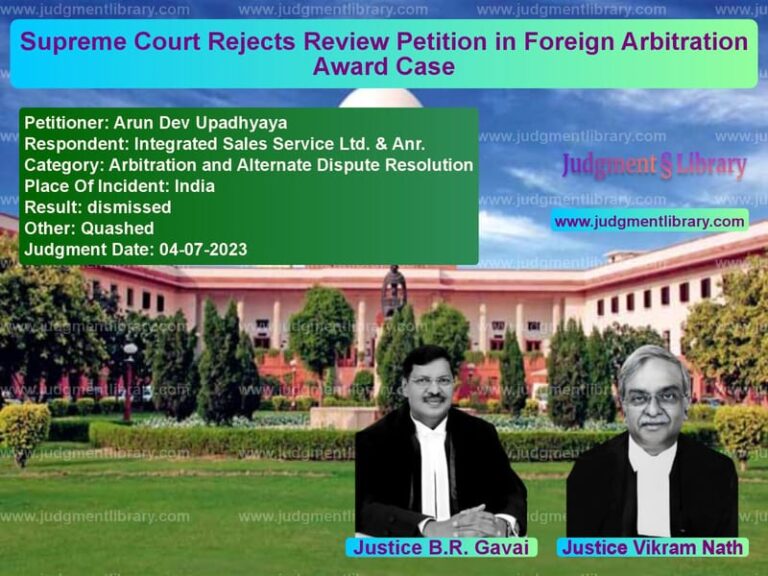Supreme Court Quashes Criminal Proceedings in Bank Fraud Case After Loan Settlement
The case of Tarina Sen vs. Union of India & Anr. involves a long-standing criminal proceeding arising from allegations of bank fraud, which the Supreme Court finally quashed on October 3, 2024. The judgment sets a crucial precedent on the role of loan settlements in criminal cases and the limits of criminal prosecution when financial disputes are resolved through lawful means.
Background of the Case
The case originated from an FIR filed on October 14, 2000, by the Central Bureau of Investigation (CBI) against five individuals, including the present appellants, for their alleged involvement in a fraudulent loan transaction. The allegations revolved around two entities—M/s Indo Global Projects Ltd. (IGPL) and M/s Clarion Travels—that obtained loans from Allahabad Bank’s Temple Marg Branch in Bhubaneswar during 1998-1999.
Read also: https://judgmentlibrary.com/supreme-court-restores-conviction-in-high-profile-bihar-murder-case/
The appellants, Tarina Sen and Shaileshree Sen, were partners in Clarion Travels and were accused of securing a loan of Rs. 8,40,000 on November 20, 1998, without adequate security. A similar loan of Rs. 11,84,600 was allegedly granted to IGPL in August 1998. The CBI accused the appellants and other co-accused of criminal conspiracy under Sections 120-B, 420, 468, and 471 of the Indian Penal Code (IPC) and Sections 13(2) read with 13(1)(d) of the Prevention of Corruption Act, 1988.
Following an investigation, a charge sheet was filed against all accused in 2002. The trial court took cognizance and issued summons. However, before the conclusion of the case, the outstanding bank dues were settled under a One-Time Settlement (OTS) scheme in 2011, and the bank declared the accounts closed.
Petitioners’ Arguments
- The appellants contended that they were merely partners in the firm and had no active role in the alleged fraud.
- The bank had accepted the OTS, and as a result, the financial liability had been fully discharged, making further criminal proceedings unnecessary.
- The continuation of criminal prosecution would be a futile exercise and cause undue hardship, especially since the main accused had passed away.
- They relied on past Supreme Court rulings that quashed criminal proceedings in financial fraud cases where the civil liability had been settled.
Respondents’ Arguments
- The CBI opposed the quashing, arguing that settlement of financial liability does not automatically absolve an accused of criminal liability.
- They maintained that the accused had played an active role in defrauding the bank and that the settlement did not erase their culpability.
- The High Court correctly refused to quash the proceedings, instead allowing the appellants to raise their arguments during the trial.
Supreme Court’s Observations
- The Court noted that the case had been pending for over two decades and that the bank had already recovered its dues.
- It cited previous rulings where criminal proceedings were quashed when financial disputes were resolved amicably.
- The Court distinguished between cases of public fraud affecting society at large and those where the alleged offense was primarily financial and private in nature.
- It found that the appellants’ involvement was limited, and no significant evidence was presented to justify their continued prosecution.
Supreme Court’s Ruling
- The Court quashed the criminal proceedings against the appellants in T.R. No. 28 of 2002, pending before the Special Judge (CBI), Bhubaneswar.
- It ruled that once a financial dispute is resolved, especially through a legally recognized settlement mechanism like the OTS, criminal prosecution should not continue unless there is clear evidence of malafide intent.
- The orders of the Orissa High Court, which had refused to quash the proceedings, were set aside.
Legal Implications of the Judgment
This ruling has significant legal ramifications:
- Impact on Bank Fraud Cases: The judgment clarifies that settlement of loans through lawful means can be a valid ground for quashing criminal proceedings in financial fraud cases.
- Protection from Harassment: The ruling safeguards individuals from prolonged criminal trials when the dispute is primarily financial and has been resolved through settlement.
- Guidance on Criminal vs. Civil Liability: The judgment reinforces that financial misconduct must be distinguished from public fraud, ensuring that criminal law is not misused for undue harassment.
Conclusion
The Supreme Court’s decision in this case serves as an important precedent in financial fraud cases, ensuring that the law is not weaponized against individuals who have settled their disputes through legal means. By quashing the criminal proceedings, the Court has upheld the principles of justice and fair trial, reinforcing the need to distinguish between criminal liability and financial disputes.
Petitioner Name: Tarina Sen.Respondent Name: Union of India & Anr..Judgment By: Justice B.R. Gavai, Justice K.V. Viswanathan.Place Of Incident: Bhubaneswar, Odisha.Judgment Date: 03-10-2024.
Don’t miss out on the full details! Download the complete judgment in PDF format below and gain valuable insights instantly!
Download Judgment: tarina-sen-vs-union-of-india-&-anr-supreme-court-of-india-judgment-dated-03-10-2024.pdf
Directly Download Judgment: Directly download this Judgment
See all petitions in Bail and Anticipatory Bail
See all petitions in Fraud and Forgery
See all petitions in Judicial Review
See all petitions in Legal Malpractice
See all petitions in Judgment by B R Gavai
See all petitions in Judgment by K.V. Viswanathan
See all petitions in allowed
See all petitions in Quashed
See all petitions in supreme court of India judgments October 2024
See all petitions in 2024 judgments
See all posts in Criminal Cases Category
See all allowed petitions in Criminal Cases Category
See all Dismissed petitions in Criminal Cases Category
See all partially allowed petitions in Criminal Cases Category

